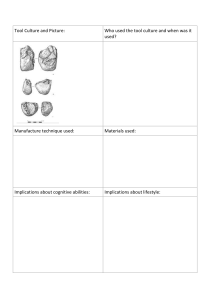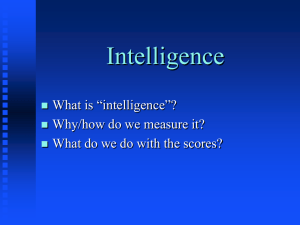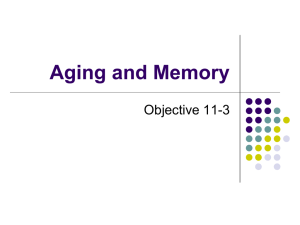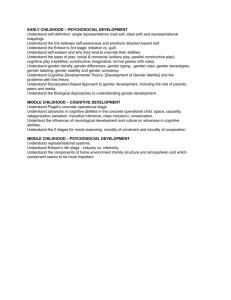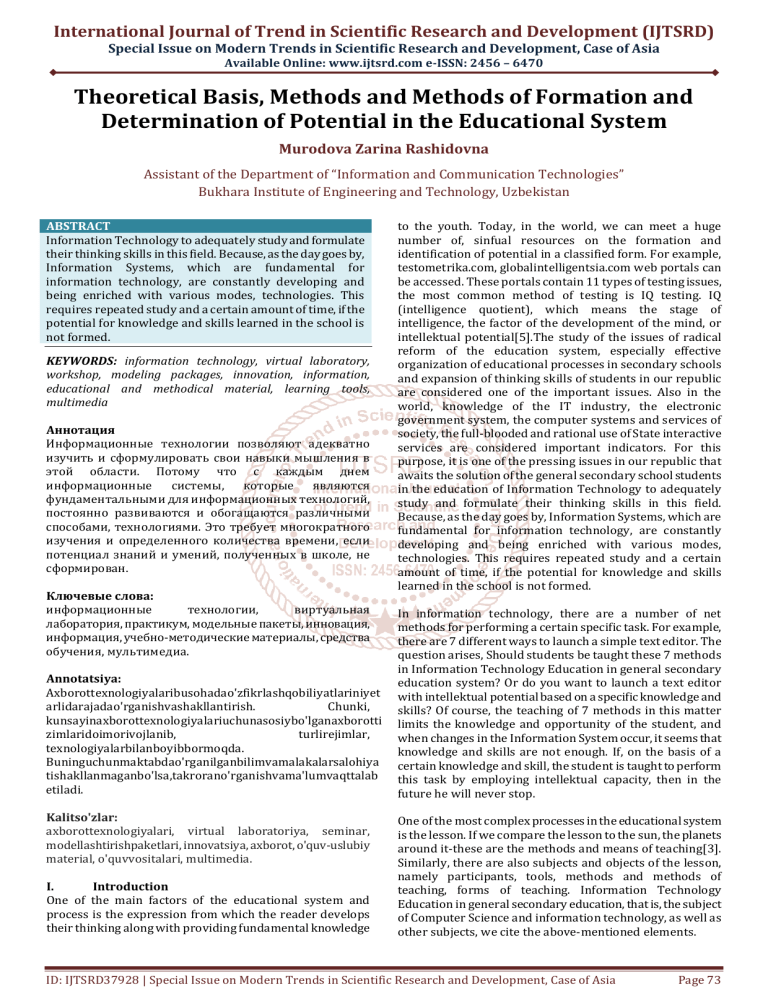
International Journal of Trend in Scientific Research and Development (IJTSRD)
Special Issue on Modern Trends in Scientific Research and Development, Case of Asia
Available Online: www.ijtsrd.com e-ISSN: 2456 – 6470
Theoretical Basis, Methods and Methods of Formation and
Determination of Potential in the Educational System
Murodova Zarina Rashidovna
Assistant of the Department of “Information and Communication Technologies”
Bukhara Institute of Engineering and Technology, Uzbekistan
ABSTRACT
Information Technology to adequately study and formulate
their thinking skills in this field. Because, as the day goes by,
Information Systems, which are fundamental for
information technology, are constantly developing and
being enriched with various modes, technologies. This
requires repeated study and a certain amount of time, if the
potential for knowledge and skills learned in the school is
not formed.
KEYWORDS: information technology, virtual laboratory,
workshop, modeling packages, innovation, information,
educational and methodical material, learning tools,
multimedia
Аннотация
Информационные технологии позволяют адекватно
изучить и сформулировать свои навыки мышления в
этой области. Потому что с каждым днем
информационные системы, которые
являются
фундаментальными для информационных технологий,
постоянно развиваются и обогащаются различными
способами, технологиями. Это требует многократного
изучения и определенного количества времени, если
потенциал знаний и умений, полученных в школе, не
сформирован.
Ключевые слова:
информационные
технологии,
виртуальная
лаборатория, практикум, модельные пакеты, инновация,
информация, учебно-методические материалы, средства
обучения, мультимедиа.
Annotatsiya:
Axborottexnologiyalaribusohadao'zfikrlashqobiliyatlariniyet
arlidarajadao'rganishvashakllantirish.
Chunki,
kunsayinaxborottexnologiyalariuchunasosiybo'lganaxborotti
zimlaridoimorivojlanib,
turlirejimlar,
texnologiyalarbilanboyibbormoqda.
Buninguchunmaktabdao'rganilganbilimvamalakalarsalohiya
tishakllanmaganbo'lsa,takrorano'rganishvama'lumvaqttalab
etiladi.
Kalitso'zlar:
axborottexnologiyalari, virtual laboratoriya, seminar,
modellashtirishpaketlari, innovatsiya, axborot, o'quv-uslubiy
material, o'quvvositalari, multimedia.
I.
Introduction
One of the main factors of the educational system and
process is the expression from which the reader develops
their thinking along with providing fundamental knowledge
to the youth. Today, in the world, we can meet a huge
number of, sinfual resources on the formation and
identification of potential in a classified form. For example,
testometrika.com, globalintelligentsia.com web portals can
be accessed. These portals contain 11 types of testing issues,
the most common method of testing is IQ testing. IQ
(intelligence quotient), which means the stage of
intelligence, the factor of the development of the mind, or
intellektual potential[5].The study of the issues of radical
reform of the education system, especially effective
organization of educational processes in secondary schools
and expansion of thinking skills of students in our republic
are considered one of the important issues. Also in the
world, knowledge of the IT industry, the electronic
government system, the computer systems and services of
society, the full-blooded and rational use of State interactive
services are considered important indicators. For this
purpose, it is one of the pressing issues in our republic that
awaits the solution of the general secondary school students
in the education of Information Technology to adequately
study and formulate their thinking skills in this field.
Because, as the day goes by, Information Systems, which are
fundamental for information technology, are constantly
developing and being enriched with various modes,
technologies. This requires repeated study and a certain
amount of time, if the potential for knowledge and skills
learned in the school is not formed.
In information technology, there are a number of net
methods for performing a certain specific task. For example,
there are 7 different ways to launch a simple text editor. The
question arises, Should students be taught these 7 methods
in Information Technology Education in general secondary
education system? Or do you want to launch a text editor
with intellektual potential based on a specific knowledge and
skills? Of course, the teaching of 7 methods in this matter
limits the knowledge and opportunity of the student, and
when changes in the Information System occur, it seems that
knowledge and skills are not enough. If, on the basis of a
certain knowledge and skill, the student is taught to perform
this task by employing intellektual capacity, then in the
future he will never stop.
One of the most complex processes in the educational system
is the lesson. If we compare the lesson to the sun, the planets
around it-these are the methods and means of teaching[3].
Similarly, there are also subjects and objects of the lesson,
namely participants, tools, methods and methods of
teaching, forms of teaching. Information Technology
Education in general secondary education, that is, the subject
of Computer Science and information technology, as well as
other subjects, we cite the above-mentioned elements.
ID: IJTSRD37928 | Special Issue on Modern Trends in Scientific Research and Development, Case of Asia
Page 73
International Journal of Trend in Scientific Research and Development (IJTSRD) @ www.ijtsrd.com eISSN: 2456-6470
Computer Engineering is introduced into the spectrum of
participants in the subject of Informatics and Information
Technology, which means that there is an effect of the
element in the subject. Computer technology can also be
used in other subjects, but in it this technique enters the
spectrum of tools. In this regard, the subject of Information
Technology Education in secondary schools in general
should take into account the position of computer
technology in the teaching of Informatics and Information
Technology. This can be the most necessary participant in
the formation and determination of the intellektual potential
of the developing learner.
Intelligence of knowledge detection (BAI) is a method and
method of determining the previously accumulated
knowledge and skills, ability to apply. BAI is responsible for
the knowledge and skills that remain in the long-term
memory that engages flexible intelligence and uses it in
practice. It includes the following:
1. Words related to the sphere (dictionary).
2. Ability to solve problems by methods previously known
and tested in the experiment.
3. The basis of general knowledge (interdependence of
subjects and fundamental subjects), knowledge of the
field.
II.
Literature review
In the educational system, a lot of scientific and
methodological research is being carried out on the
formation of potential. These are done mainly due to the fact
that each school subject and each subject has its own
characteristics. The subjects and objects of the above lesson,
that is, participants, supplies, as well as affect the choice of
methods and methods.
According to scientists, the level of BAI in different and
different areas is different. For example, taking the use of
Information Technology, a programmer, a system
administrator, can be useful.
The theory of Kettell-Horn-Carol is widely used in the world
and is one of its own theories for the emergence of the
psychosocial andididor of young people, the formation
ofualual potential[7]. This theory gives a broader
interpretation of the psychological theory of the structure of
cognitive abilities of students, and at the same time it is
aimed at developing the intellektual potential of the learner
by combining the theory of three major theorists Raymond
Kettell, John Horn and John Carols[10]. This theory has been
proven to be important for people engaged in self-education
based on the results of numerous methodological studies
over the last years of the 20th century[8].
The Nobel Prize winner, James Heckman, professor at the
University of Chicago (James Heckman), argues that
economic systems are related to human abilities and skills
(human skills) [4]. According to the scientist, any large
economy is based on the development of skills, knowledge,
abilities and skills of citizens. According to the scientist's
account, at least 13 percent of the costs incurred for early
education will “return to society”in the future. The
development of social skills in children from an early age
along with cognitive abilities leads to the emergence of
citizens who will benefit society in the future.
Kettell-Horn-Carol's theory is two, Kettell-Horn's theory of
flexibility and cognitive detection intelligence is Carol's
theory of three levels of Cognitive Ability[2]. Both theories
have close similarities, which helped to combine these
theories among themselves. Method for the formation of
multi-intellectual capacity based on the analysis of scientific
and applied works, the definition of flexibility and
knowledge intellekt is divided into:
Flexible intelligence includes the following abilities and
qualities:
1. To learn.
2. Mavhum (abstract) thinking ability.
3. Ability to interact, find and identify laws, systematize
information obtained, analyze and process new
knowledge.
4. Ability to adapt to new conditions, flexibility.
5. Deductive and inductive thinking ability.
6. Ability to solve problems encountered for the first time
7. Use new approaches to solving problems that were
previously obvious.
8. Ability to remember. In most cases, flexibility is
important for Intel's level of development.
The period of development of most of these skills and
qualities rises to the highest peak of school age in general
secondary education. After that, its level begins to gradually
decrease[5].
Bai's commitment to flexibility is that the faster it learns, the
more knowledge and knowledge it can be acquired, the more
knowledge capacity andualual capacity it will have.
According to Uzbek scientists, the socio-psychological factors
of the formation of independent thinking, creative abilities in
the students form and determine the peculiarities of
intellectual potential through independent thinking,
formation of creative thinking through interactive
educational methods that motivate independent thinking, as
well as cognitive approaches in the educational process[3].
Based on the above, it is necessary to pay great attention to
cognitive abilities in secondary schools in general. Especially
today, within the framework of e-government, every
graduate of the school is in a certain sense a requirement for
a period of determining flexibility and knowledge within the
framework of Information Technology Education, focusing
on the content and process of education on cognitive
abilities.
Igor Boltovnin believes that the levels of cognitive abilities
are different, and Carroll put forward the idea of three
cognitive stages [2]:
III.
Analysis
First level: limited abilities. This is the exact capabilities of
the cognitive phase and its basis and the main component.
1. Speed of speech, knowledge of grammar and vocabulary,
ability to learn foreign languages, ability to listen and
communicate.
2. The speed of reading, the ability to understand and
master what has been read, the speed of writing and the
ability to decrypt.
3. Mathematical knowledge.
ID: IJTSRD37928 | Special Issue on Modern Trends in Scientific Research and Development, Case of Asia
Page 74
International Journal of Trend in Scientific Research and Development (IJTSRD) @ www.ijtsrd.com eISSN: 2456-6470
4.
5.
6.
7.
8.
The ability to deduce and inductively think, to correctly
build a logical sequence of thoughts.
Speed of memory and the ability to remember.
Speed of thinking and finding quick rules, originality
Ability to recall heard information, ability to recognize
and localize algorithm execution for an event, event.
Ability to see visually, the level of development of visual
memory, the ability to think and think based on visual
objects.
Second level: extensive skills. These include:
1. Cognitive achievements: prior experience, ability to
think based on results, ability to practice prior
knowledge.
2. Ability to read and write.
3. Ability to master quantitative concepts and perform
actions with numbers
4. Ability to explain.
5. Fast memory and long storage life of esga.
6. Long-term memory and the ability to retrieve
information from it.
7. Ability to process, understand and perceive in the
process of hearing.
8. Visual processing capability.
9. Ability to perform some tasks automatically.
Third level:
general intelligence. General intellektual ability is the level of
interrelation between broad abilities.A lot of scientific and
methodological research has been carried out in the world
aimed at shaping and developing potential, and they are
based on various theories. There are also many ways to
develop intelligence and thinking in the world community.
Today, in monitoring the development of the world in this
direction, it is possible to find trainings, seminars, training
programs, Online Courses by foreign specialists in the global
networks of the internet. There are more known methods in
these systems - solving logical problems and puzzles, finding
tests, playing chess and so on. But the market of services in
the field of intelligence is developing rapidly and is
complemented by innovative technologies. For example,
after the Second World hit, Japan in the fast pictures with its
most effective approach was among the developed countries.
One of the main reasons for this is the result of a wide
opening to scientific, methodological research devoted to the
formation and determination of intellektual potential among
schoolchildren, students, young people. This method is called
the Japanese intellekt system of development. The system
was proposed by a Japanese scientist - Professor, Doctor of
Medical Sciences and a tomography specialist named Ruta
Kavashima. They have been studying the stimulation of the
human brain for more than twenty years, and in 2003 year
“train the mind. He published scientific works” Japanese
system for the development of intelligence and memory“,”
Japanese system for the development of intelligence". These
scientists first determined how effectively the person's mind
works at the moment, and secondly, a lot of simple exercises
for the development and development of thinking,
intelligence and memory in it, in the third. he put forward an
idea that included special methods to evaluate the ability
from time to time.
Ryuta Kavashima in his studies concluded that when a
person solves arithmetic problems and solves them for a
while, the brain demonstrates maximum activity. He also
determined that reading aloud would give good results.
However, he decides to pay special attention to
mathematical problems, as a result of which his research
results and scientific Monographs are created, which offer a
lot of arithmetic assignments, exercises.
IV.
Discussion
The approach of kavashima consists of two stages:
1. Encourages the reader to pass the main tests. This
allows you to determine the initial starting point – the
current level of knowledge. During this test, it is
required to perform several exercises. Among them, for
example, a loud counting test from 1 to 120, a word
memorization test in two minutes, and so on . After
completing the tasks, the results are recorded.
2. The reader goes to the theoretical and practical source
and begins to solve the main arithmetic problems. It is
necessary to study every day, having completed all the
assignments that are set.
This method exists today not only in Japan, but also
throughout the world and has its own methods, for example,
there are theories developed on the basis of Kores, Chinese,
American, European, Russian approaches.
In addition to such approach theories, there are game
technologies, theories, methods and methods that are based
on logic, focusing on the formation and determination of
intellekt.
Games on logic and thought have been used for a long time in
pedagogy for the purpose of teaching, for example, roleplaying in historical sciences, in Computer Science and
Information Technology F.It is reflected in the works of
murodova. Tirishga develop useful skills through the game
based on their results and developed separate lessons and
even training cards based on the full. In contrast to these,
logical games can be accessed from ancient chess to modern
flexible platforms that students will like, with applications
that include a variety of functions, head-strings and puzzles.
Their undoubted advantage is that sometimes they are equal
in appearance, usefulness, introversion and excitement with
famous people. Today, even without leaving home, every
reader connected to the Internet can formulate and
determine their own intellektual potential by solving several
puzzles in their spare time or by finding several puzzles.
V.
Conclusion
However, it is necessary to have such a goal, that is,
educational games, with the help of which students should
be able to study the theoretical, practical knowledge and
skills of the corresponding subject and sharpen the mind. In
general, logical games are an excellent educational strategy
that will help to encourage reading. To them it is possible to
add the following games:
The term gamification (gamification) was translated from
English into Russian in 2019 year and is a theory of games
having its place in world society. In order to increase the
level of participation in the Bunda and solve tasks, it is aimed
at the use of game modes and playing style in non-game
situations . Gamification methods seek to influence a
person's natural predisposition to competition,
achievements and self-expression. The principle is that
games are common in marketing and online shopping
ID: IJTSRD37928 | Special Issue on Modern Trends in Scientific Research and Development, Case of Asia
Page 75
International Journal of Trend in Scientific Research and Development (IJTSRD) @ www.ijtsrd.com eISSN: 2456-6470
centers to attract and retain customers. Gamification of the
educational process is also a progressive direction in the
education of the XXI century. It covers not only classical
education, but also educational programs and online courses.
For example, Microsoft has released Ribbon Hero 2 as an
assistant product for its office suite. The game was created to
help users learn how to use MS Office applications effectively
and has become one of the most popular Microsoft Labs
projects. The well-known MOOC educational portal
HanAcademy is also implementing a wide range of games in
its programs. The New York Department of Education is
successfully implementing the idea of the Quest to learn
School, where the entire learning process passes through the
games.
be used in traditional ways. Despite the information age,
many logical and puzzle games are effective and interesting
for fans. This is due to the fact that some of them did not
receive high-quality analogues in the form of computer
programs, while others are much more interesting and
pleasant to play, communicate and experience "live".
It can be argued that logical ,ualual and other games are not
only important in the process of teaching students. They are
widely used in training for adults to improve skills and
efficiency, in seminars, because they allow them to see the
practical benefits of the knowledge gained immediately.
Even schoolchildren are often checked for resumes under
certain conditions, and in order to know if there are any
specified analytical abilities, the HR-manager is assigned the
task of finding a riddle or puzzle.
REFERENCES:
[1] AzarovYu.P. The art of education: Prince. for the
teacher. - 2nd ed. - M., 1989.
It's hard to believe, but adults often can not do what the child
can do in a few minutes. Therefore, not only for professional
development, but also for self-development in general, the
solution of the simplest tasks on logic and reasoning plays an
important role. It helps to form useful skills such as memory,
attention, verbal counting and develop creative abilities
.tirishga
Online games are a set of logical games that offer some
games, tasks and tasks that are performed as online flash
applications, and in addition to being convenient, they also
teach different ages and different skills. For example, the
puzzle" six frogs " - the basis of this program is a
mathematical puzzle about six very well-known frogs. This
online flash game may seem simple and easy to read, but
when they try to fulfill the condition, they usually change
their mind. According to the analysis, a person with an
average IQ (100-110 points) should find the answer in 3
minutes. Its goal is to develop intellectual capacity, logical
thinking, verbal counting skills, which can be counted in
many such online games.
In order to increase and determine the potential of students,
it is necessary to pay attention mainly to the content of
science taught in the school, as well as to choose IQ
instruments based on this content. Therefore, it is necessary
to study the content and current state of Information
Technology Education in secondary schools on the basis of
analytical and critical, modern requirements.
[2]
Andreeva G.M. Social Psychology. -M .: Moscow
Publishing House. University, 1980, p. 175-298.
[3]
Antsiferova L.I. The principle of the connection of
consciousness and activity and the methodology of
psychology // Methodological and theoretical
problems of psychology. -M.; Science, 1969.
[4]
Muradova F. R., Murodova Z. R. Use of information
technologies in education/International Journal of
Psychosocial Rehabilitation, UK. -2020.- P. 3110-3116
[5]
Muradova F. R., Kadirova Sh.M.The use of innovative
methods in education // Проблемы и перспективы
развития образования, Krasnodar.- 2019. P. 62-63.
[6]
Muradova F.R., KadirovR.J. Игровые технологии
один из эффективных способов обучения
учащихся на уроках информатики //Вестник
магистратуры,Russian.- 2019,-P. 60-62.
[7]
MuradovaF.R. Game Technology for Science Lessons
// Eastern European Scientific Journal, Germany. 2017. - P. 107-109
[8]
Muradova F. R. Virtual laboratories in teaching and
education.ISJ Theoretical & Applied science.
Philadelphia, USA. 2020. P. 106-109.
[9]
Murodova Z. R. The formation and definition of the
intellectual potential in education.ISJ Theoretical &
Applied science. Philadelphia, USA. 2020. P. 113-116.
In addition to computer-oriented game technologies, there
are some games dedicated to finding puzzles, they can also
ID: IJTSRD37928 | Special Issue on Modern Trends in Scientific Research and Development, Case of Asia
Page 76

